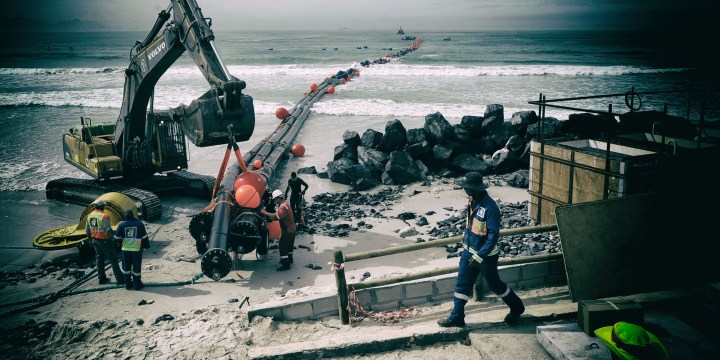RIGHT OF REPLY
Cape Town is not only choosing desalination — it is also creating a local green economy, again

Contrary to allegations that the City of Cape Town is choosing expensive hi-tech desalination plants over labour-intensive alien plant clearing to boost its water supply, both options are being pursued.
The Daily Maverick article “Cape Town is choosing desalination plants over creating local green economy – again” on 12 September by the GOOD party’s national policy officer, Mark Rountree, is replete with misrepresentation and distortion of facts.
Engaging with the City’s Water Strategy would quickly clear up any misunderstanding on this issue and others, and the author is encouraged to do so. In the interim, I would like to clear up some of the more glaring misrepresentations before this misinformation spreads further:
1. “On Wednesday the City announced it is now considering another new desalination plant.”
It is inaccurate to suggest that this decision/announcement was brought to public attention a week ago.
The City’s draft Water Strategy was published for public consideration
and input eight months ago, in February 2019. Permanent desalination was discussed in that document, and even prior to that, was included in the City’s final Water Outlook document, a public document that was released in December 2018.
The council approved the Water Strategy, taking public comments into
account, in May 2019.
2. “(A permanent desalination plant) contradicts the advice of
desalination experts at the World Bank.”
A desalination expert from the US, sponsored by World Bank, advised the City in 2018 that the best course of action was to “start small, but with large plant technology”. Specifically, the optimal scenario would entail construction of a 50MLD (megalitres per day) plant which had the capability of expansion to produce 100 or 150MLD.
This would allow the City to produce more desalinated water should that be required in another drought event. The report produced by this World Bank expert built on the work done by the previous two World Bank experts who had consulted with City in late in 2017.
In short, it is an enhancement of the findings of the first two World Bank experts, as well as collaboration with a range of other field experts, both local and international, all of which contributed to the overall Water Strategy.
It is also important to note that while neither groundwater extraction nor water reuse are drought-proof, desalination is virtually endlessly scalable.
3. “The City of Cape Town’s announcement that it is considering investing in more small desalination plants, instead of investing in the Green Economy through local jobs, makes no financial or environmental sense.”
It is difficult to understand the reasoning behind the suggestion that building a desalination plant and clearing alien vegetation are projects that cannot be undertaken at the same time.
Desalination forms one aspect of a comprehensive strategy that seeks to optimise the resources we have (by eradication of alien species, for example) while exploring and developing new ones (desalination, reuse and groundwater).
The City is working with the Nature Conservancy’s Greater Cape Town Water Fund which is clearing alien vegetation in catchment areas, both within and beyond our municipal boundaries.
The current clearing initiatives are estimated to release yield of about two months’ worth of water within six years of the project.
Women-led teams are tackling the most critical areas. 1,200 hectares of rooikrans and Port Jackson have been cleared in the main infiltration zone of the Atlantis aquifer alone, releasing approximately one billion litres of water.
Read the full strategy here. DM
Caitlin Montague is Senior Professional Officer in the office of Cape Town’s Mayoral Committee Member for Water and Waste, Xanthea Limberg.


















 Become an Insider
Become an Insider